外研版八年级英语上册课件 Module11 Way of life.Unit1 (2)(共37张PPT)
文档属性
| 名称 | 外研版八年级英语上册课件 Module11 Way of life.Unit1 (2)(共37张PPT) | 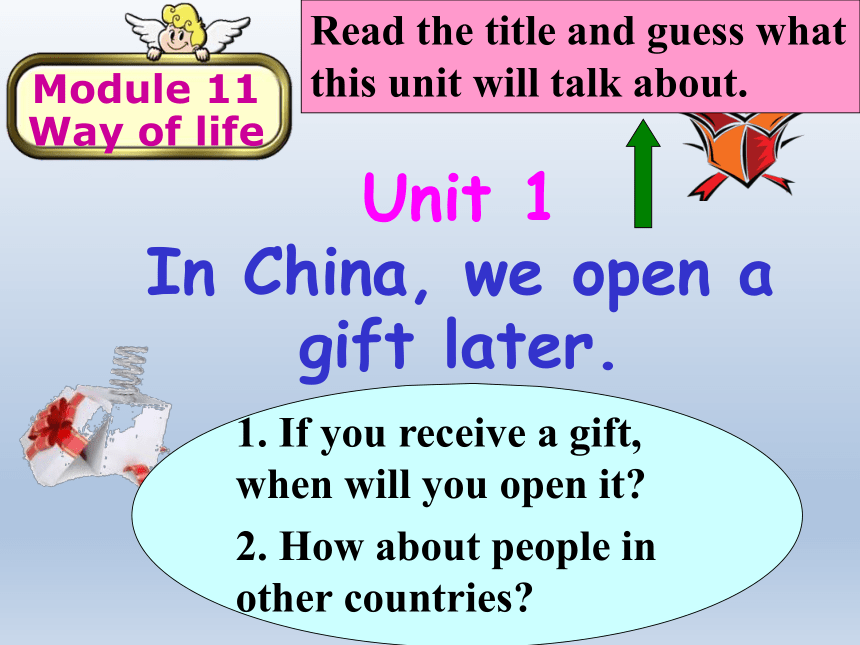 | |
| 格式 | ppt | ||
| 文件大小 | 4.6MB | ||
| 资源类型 | 教案 | ||
| 版本资源 | 外研版 | ||
| 科目 | 英语 | ||
| 更新时间 | 2022-08-03 14:33:19 | ||
图片预览


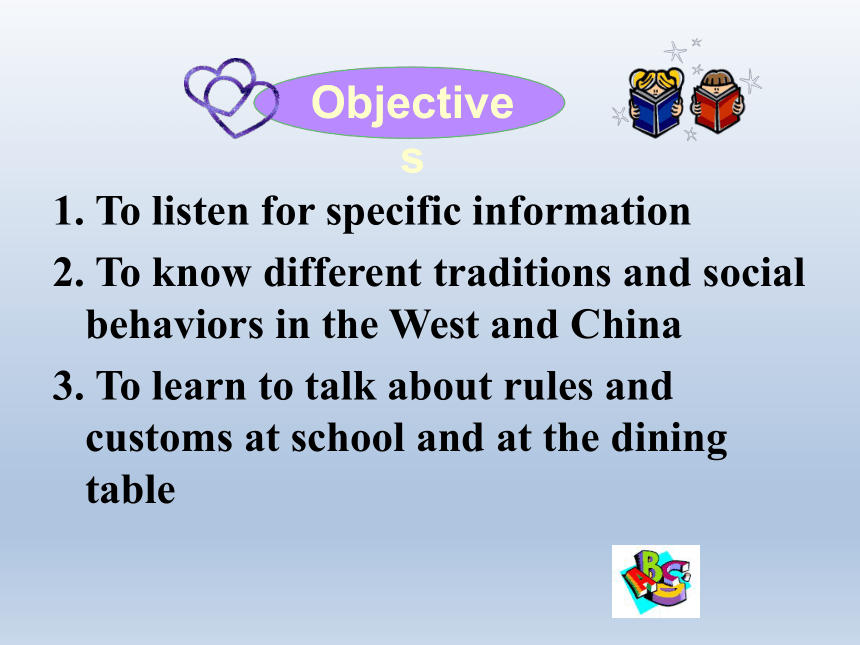

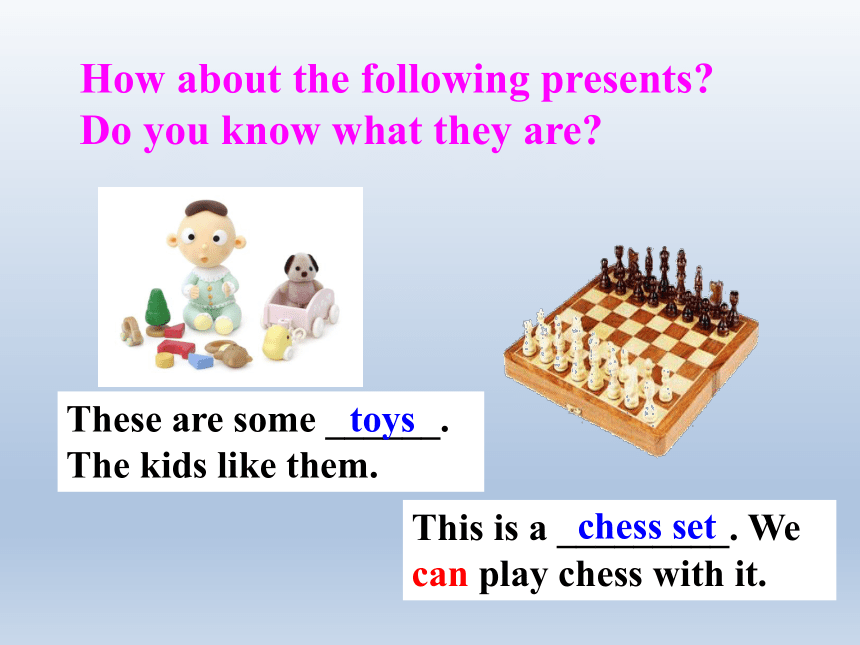
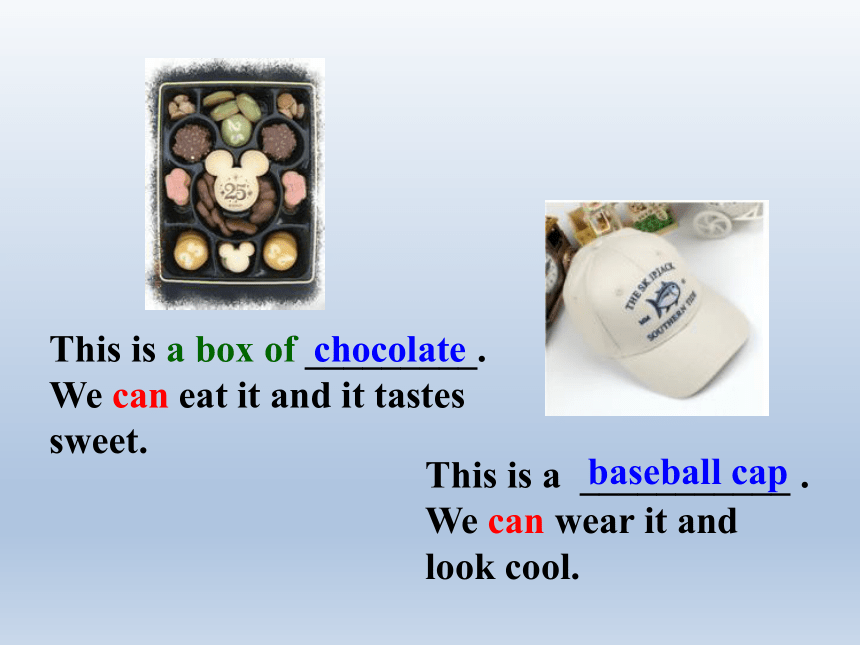
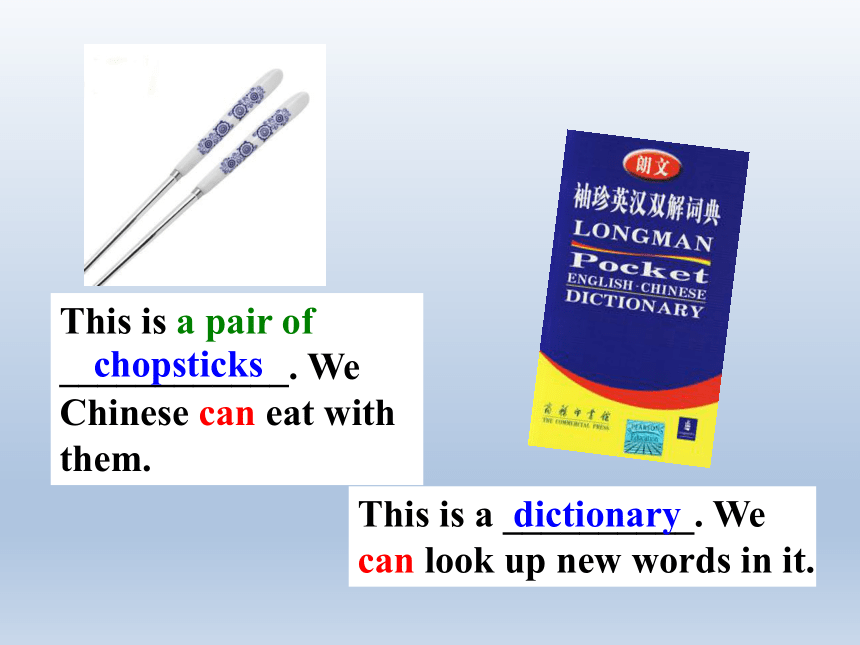

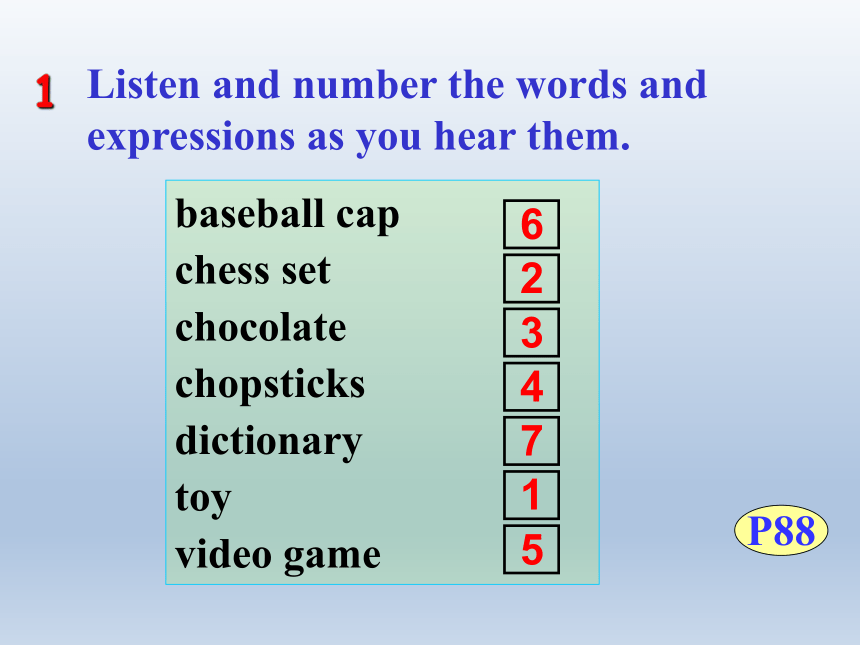
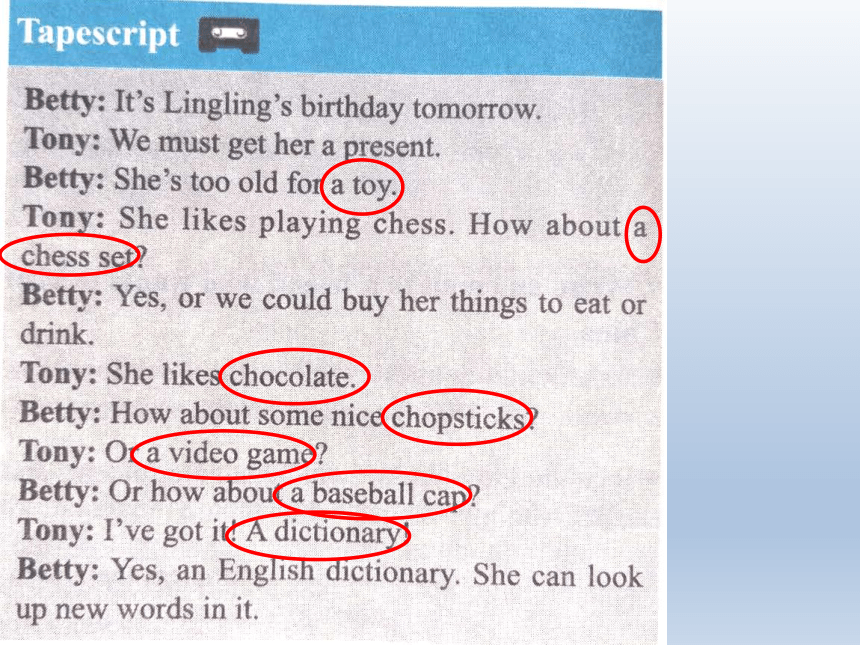
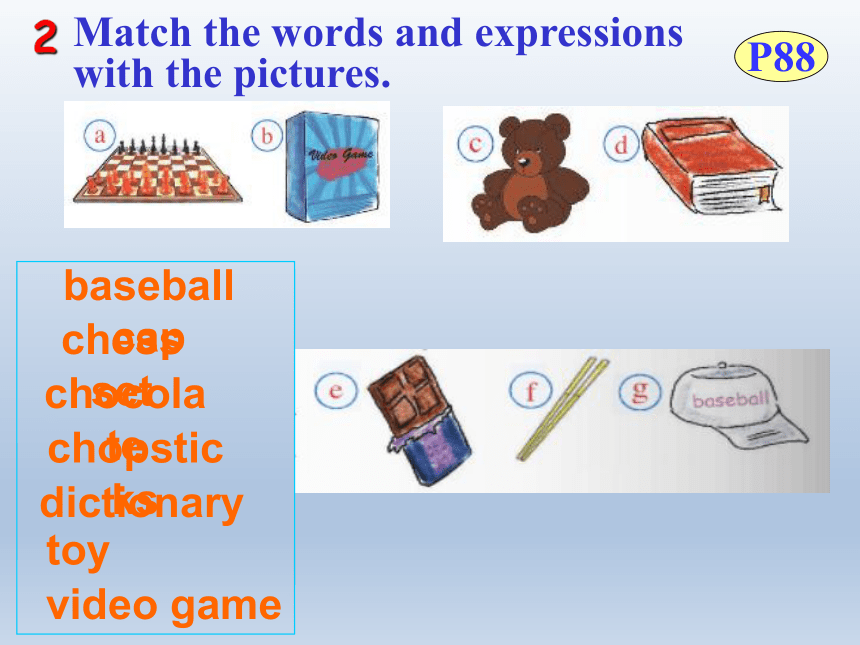
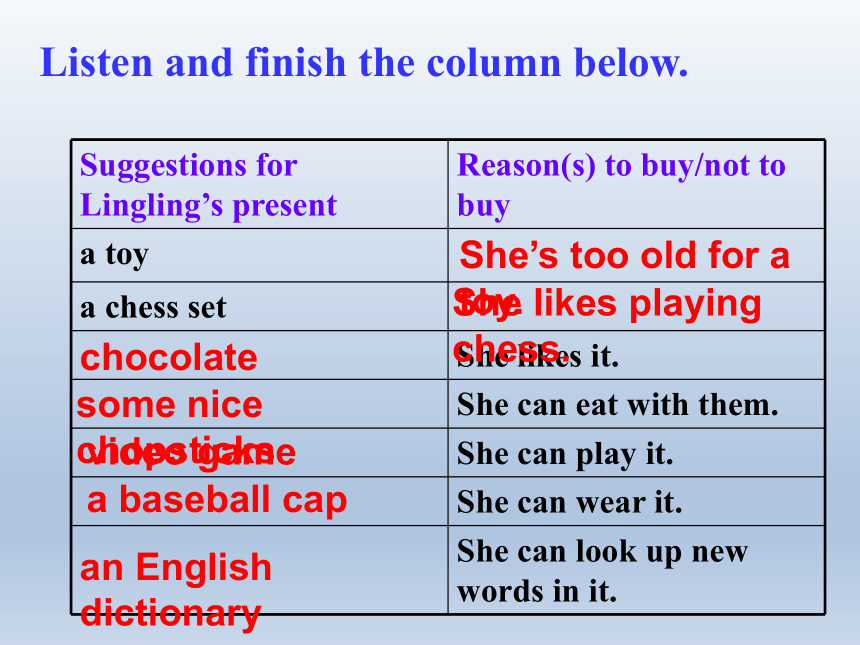
文档简介
(共37张PPT)
Unit 1 In China, we open a gift later.
Module 11
Way of life
1. If you receive a gift, when will you open it
2. How about people in other countries
Read the title and guess what this unit will talk about.
Customs of giving and receiving gifts in different countries:
For reference
1. To listen for specific information
2. To know different traditions and social behaviors in the West and China
3. To learn to talk about rules and customs at school and at the dining table
Objectives
Suppose your birthday is coming, what do you want for it
These are some ______. The kids like them.
toys
This is a _________. We can play chess with it.
chess set
How about the following presents
Do you know what they are
This is a box of _________. We can eat it and it tastes sweet.
chocolate
This is a ___________ . We can wear it and look cool.
baseball cap
This is a __________. We can look up new words in it.
dictionary
This is a pair of ____________. We Chinese can eat with them.
chopsticks
This is a ___________. We can play with it.
video game
baseball cap
chess set
chocolate
chopsticks
dictionary
toy
video game
2
5
3
4
1
6
7
Listen and number the words and expressions as you hear them.
1
P88
Match the words and expressions with the pictures.
chocolate
chess set
dictionary
baseball cap
chopsticks
video game
toy
2
P88
Listen and finish the column below.
Suggestions for Lingling’s present Reason(s) to buy/not to buy
a toy
a chess set
She likes it.
She can eat with them.
She can play it.
She can wear it.
She can look up new words in it.
She’s too old for a toy.
She likes playing chess.
chocolate
some nice chopsticks
video game
a baseball cap
an English dictionary
Listen again and answer:
What present do they want to buy for Lingling
An English dictionary.
It’s Lingling’s birthday today. Watch and read. Then finish the following tasks.
Choose the best answer for each sentence.
In the US, when someone gives you
a present, you should open it _______.
A. later B. immediately
C. in five minutes
2. When you accept a present, you must use _____ in China.
A. left hand B. both hands
C. right hand
Task 1
3. When you accept a present, you can use
_____ in Britain.
A. both hands B. one hand C. a box
4. Hongbao in ____ paper is lucky.
A. white B. green C. red
5. You mustn’t do any ______ on the first
day of the Spring Festival in China.
A. shopping B. cleaning C. cooking
1. Open a present immediately when you receive it.
2. Accept a present with both hands.
3. Use red paper for hongbao.
4. Do cleaning on the first day of the Spring Festival.
5. Break something during the Spring Festival.
6. Have your hair cut during the Spring Festival month.
√
√
Check (√) what you usually do in China.
Task 2
3
P88
1. Do people open a gift in China immediately
or later
2. Do people open a gift in the US immediately
or later
3. What is bad luck at the Spring Festival
Task 3
Answer the following questions.
They open a gift immediately.
They open a gift later.
Do cleaning on the first day of the Spring Festival;
Break something during the Spring Festival;
3)Have your hair cut during the Spring Festival month.
Task 4
Complete the table about different behaviours between China and the West.
China The West
Difference 1
Difference 2
open a gift later
open a gift immediately
accept a gift with both hands
don’t pay much attention to that
Task 5
List the Chinese traditions mentioned in the
conversation:
Open a gift later.
Accept a gift with both hands.
3. You mustn’t do any cleaning on the first day of the Spring Festival.
4. You mustn’t break anything during the Spring Festival.
5. You must only use red paper for hongbao.
6. You’d better not have your hair cut during the Spring Festival month.
7. In the north of China, people eat lots of jiaozi.
can “许可,可以”
cannot (can’t) “不可能”
must “必须,一定要”
must not (mustn’t) “不能;禁止”
need “需要”
need not (needn’t) “不需要;不必要”
had better “最好……”
had better not “最好不要……”
should “应该,将会”
should not (shouldn’t) “不应该”
Try to translate the following sentences.
Read and try to recite the conversations in 5-10 minutes.
Role-play
1. Read the dialogue aloud for a few minutes by yourself;
2. Role play in groups;
3. Role play in front of the class.
We’ll see which group does the best.
1. 一副国际象棋 _________
2. 电子游戏 _____________
3. 注意;留心 ________________
4. 例如 ____________
5. 剪头发 ________________
a chess set
video game
pay attention to
for example
have one’s hair cut
Translate the following expressions into English.
Task 6
It is always a(n) (1) _______ to receive gifts from family members and friends. In China, we usually (2) _______ a gift with both hands and open it later. But in the West, people usually do not pay much (3) _______ to that. During the Spring Festival, there are many (4) _________. For example, people in the north of China eat lots of jiaozi. They (5) ________ great.
traditions
accept attention surprise taste traditions
taste
surprise
accept
attention
Task 7
Complete the passage with the words in the box.
4
P89
Spring Festival Christmas
Christmas is a very important festival in western countries, just like Spring Festival in China.
For reference
Pronunciation and speaking
1. I don’t think I should open it now.
2. You needn’t wait!
3. You mustn’t break anything.
4. You must only use red paper for hongbao.
5. You’d better not have your hair cut during the Spring Festival month.
Read and predict how the speaker will pronounce the underlined words.
5
P89
6
Now listen and check.
7
Read the sentences in Activity 5 aloud.
Think about what you must and mustn’t/ can’t do in the situations. Write notes.
8
P89
Must Mustn’t/Can’t
At school put up your hand before you talk
At the dining table talk with food in your mouth
Visiting people
In the library
…
eat in class
wait for others to start the meal
bring flowers or a present
be late
be quiet
chat with others
Now work in pairs to make short dialogues with the help of the table.
Talk
For example:
What must you do at school
I must put up my hand before I talk.
What can’t you do at the dining table
I can’t talk with food in my mouth.
本课时主要短语和句型
总结回顾
1. a chess set
2. video game
3. pay attention to 4. for example
5. have one’s hair cut
6. You can open it!
7. I don’t think I should open it now. In China, we open a gift later.
8. You needn’t wait!
9. … you mustn’t do any cleaning on the first day of the Spring Festival./
10. You can’t be serious!
Now 2 minutes to test your spelling.
Spelling Bee
1. English-Chinese
immediately tradition video game chopstick chess serious tradition
2. Chinese-English
使…吃惊 例如 有……的味道
When finishing, exchange your papers to see who does the best.
1. My uncle bought a _____ of furniture
for his new house last week.
2. The boy hurt himself badly, so we should take him to the hospital ___________.
3. Celebrating the Spring Festival is a ________ for Chinese people.
4. We all like our English teacher although she is very ________ sometimes.
5. Can you tell me any __________ between American English and British English
set
immediately
tradition
serious
differences
Quiz
immediate different traditional serious set
I. 用所给单词的恰当形式填空。
Ⅱ. 根据提示写出正确的单词。
Jane’s birthday is coming. I want to
buy a nice g_____ for her.
2. The vegetable soup t______ delicious.
Can I have some more
3. In this country, July and August are the hottest m______ in a year.
4. Mike, if you come to China, please learn to use c_________ for meals.
5. — Lingling, can I use your dictionary
— Sure, but you m____ return it after
class.
ift
astes
onths
hopsticks
ust
III. 根据句意及汉语提示完成英语句子。
1. 我认为你不应该把坏消息告诉他。
I ______ ______ you ______ tell him
the bad news.
2. 我们应该每天做一些运动,比如游泳
和跑步。
We should do some sports every day,
____ _______, swimming and running.
3. 你最好不要错过末班公共汽车。
You ____ ______ ____ miss the last bus.
don’t think should
for example
had better not
4. 我明天去理发店理发。
I’ll go to the barber’s(理发店) to _____
my hair ______ tomorrow.
5. 人们希望当地政府能关注这个问题。
People hope the local government will
______ _________ ____ the problem.
have
cut
pay attention to
Homework
1. Make a dialogue with your classmates to talk about rules at your school using some modal verbs you’ve learnt today.
2. Finish the exercises in Learning English.
3. Preview the passage My experiences in England on page 90.
Unit 1 In China, we open a gift later.
Module 11
Way of life
1. If you receive a gift, when will you open it
2. How about people in other countries
Read the title and guess what this unit will talk about.
Customs of giving and receiving gifts in different countries:
For reference
1. To listen for specific information
2. To know different traditions and social behaviors in the West and China
3. To learn to talk about rules and customs at school and at the dining table
Objectives
Suppose your birthday is coming, what do you want for it
These are some ______. The kids like them.
toys
This is a _________. We can play chess with it.
chess set
How about the following presents
Do you know what they are
This is a box of _________. We can eat it and it tastes sweet.
chocolate
This is a ___________ . We can wear it and look cool.
baseball cap
This is a __________. We can look up new words in it.
dictionary
This is a pair of ____________. We Chinese can eat with them.
chopsticks
This is a ___________. We can play with it.
video game
baseball cap
chess set
chocolate
chopsticks
dictionary
toy
video game
2
5
3
4
1
6
7
Listen and number the words and expressions as you hear them.
1
P88
Match the words and expressions with the pictures.
chocolate
chess set
dictionary
baseball cap
chopsticks
video game
toy
2
P88
Listen and finish the column below.
Suggestions for Lingling’s present Reason(s) to buy/not to buy
a toy
a chess set
She likes it.
She can eat with them.
She can play it.
She can wear it.
She can look up new words in it.
She’s too old for a toy.
She likes playing chess.
chocolate
some nice chopsticks
video game
a baseball cap
an English dictionary
Listen again and answer:
What present do they want to buy for Lingling
An English dictionary.
It’s Lingling’s birthday today. Watch and read. Then finish the following tasks.
Choose the best answer for each sentence.
In the US, when someone gives you
a present, you should open it _______.
A. later B. immediately
C. in five minutes
2. When you accept a present, you must use _____ in China.
A. left hand B. both hands
C. right hand
Task 1
3. When you accept a present, you can use
_____ in Britain.
A. both hands B. one hand C. a box
4. Hongbao in ____ paper is lucky.
A. white B. green C. red
5. You mustn’t do any ______ on the first
day of the Spring Festival in China.
A. shopping B. cleaning C. cooking
1. Open a present immediately when you receive it.
2. Accept a present with both hands.
3. Use red paper for hongbao.
4. Do cleaning on the first day of the Spring Festival.
5. Break something during the Spring Festival.
6. Have your hair cut during the Spring Festival month.
√
√
Check (√) what you usually do in China.
Task 2
3
P88
1. Do people open a gift in China immediately
or later
2. Do people open a gift in the US immediately
or later
3. What is bad luck at the Spring Festival
Task 3
Answer the following questions.
They open a gift immediately.
They open a gift later.
Do cleaning on the first day of the Spring Festival;
Break something during the Spring Festival;
3)Have your hair cut during the Spring Festival month.
Task 4
Complete the table about different behaviours between China and the West.
China The West
Difference 1
Difference 2
open a gift later
open a gift immediately
accept a gift with both hands
don’t pay much attention to that
Task 5
List the Chinese traditions mentioned in the
conversation:
Open a gift later.
Accept a gift with both hands.
3. You mustn’t do any cleaning on the first day of the Spring Festival.
4. You mustn’t break anything during the Spring Festival.
5. You must only use red paper for hongbao.
6. You’d better not have your hair cut during the Spring Festival month.
7. In the north of China, people eat lots of jiaozi.
can “许可,可以”
cannot (can’t) “不可能”
must “必须,一定要”
must not (mustn’t) “不能;禁止”
need “需要”
need not (needn’t) “不需要;不必要”
had better “最好……”
had better not “最好不要……”
should “应该,将会”
should not (shouldn’t) “不应该”
Try to translate the following sentences.
Read and try to recite the conversations in 5-10 minutes.
Role-play
1. Read the dialogue aloud for a few minutes by yourself;
2. Role play in groups;
3. Role play in front of the class.
We’ll see which group does the best.
1. 一副国际象棋 _________
2. 电子游戏 _____________
3. 注意;留心 ________________
4. 例如 ____________
5. 剪头发 ________________
a chess set
video game
pay attention to
for example
have one’s hair cut
Translate the following expressions into English.
Task 6
It is always a(n) (1) _______ to receive gifts from family members and friends. In China, we usually (2) _______ a gift with both hands and open it later. But in the West, people usually do not pay much (3) _______ to that. During the Spring Festival, there are many (4) _________. For example, people in the north of China eat lots of jiaozi. They (5) ________ great.
traditions
accept attention surprise taste traditions
taste
surprise
accept
attention
Task 7
Complete the passage with the words in the box.
4
P89
Spring Festival Christmas
Christmas is a very important festival in western countries, just like Spring Festival in China.
For reference
Pronunciation and speaking
1. I don’t think I should open it now.
2. You needn’t wait!
3. You mustn’t break anything.
4. You must only use red paper for hongbao.
5. You’d better not have your hair cut during the Spring Festival month.
Read and predict how the speaker will pronounce the underlined words.
5
P89
6
Now listen and check.
7
Read the sentences in Activity 5 aloud.
Think about what you must and mustn’t/ can’t do in the situations. Write notes.
8
P89
Must Mustn’t/Can’t
At school put up your hand before you talk
At the dining table talk with food in your mouth
Visiting people
In the library
…
eat in class
wait for others to start the meal
bring flowers or a present
be late
be quiet
chat with others
Now work in pairs to make short dialogues with the help of the table.
Talk
For example:
What must you do at school
I must put up my hand before I talk.
What can’t you do at the dining table
I can’t talk with food in my mouth.
本课时主要短语和句型
总结回顾
1. a chess set
2. video game
3. pay attention to 4. for example
5. have one’s hair cut
6. You can open it!
7. I don’t think I should open it now. In China, we open a gift later.
8. You needn’t wait!
9. … you mustn’t do any cleaning on the first day of the Spring Festival./
10. You can’t be serious!
Now 2 minutes to test your spelling.
Spelling Bee
1. English-Chinese
immediately tradition video game chopstick chess serious tradition
2. Chinese-English
使…吃惊 例如 有……的味道
When finishing, exchange your papers to see who does the best.
1. My uncle bought a _____ of furniture
for his new house last week.
2. The boy hurt himself badly, so we should take him to the hospital ___________.
3. Celebrating the Spring Festival is a ________ for Chinese people.
4. We all like our English teacher although she is very ________ sometimes.
5. Can you tell me any __________ between American English and British English
set
immediately
tradition
serious
differences
Quiz
immediate different traditional serious set
I. 用所给单词的恰当形式填空。
Ⅱ. 根据提示写出正确的单词。
Jane’s birthday is coming. I want to
buy a nice g_____ for her.
2. The vegetable soup t______ delicious.
Can I have some more
3. In this country, July and August are the hottest m______ in a year.
4. Mike, if you come to China, please learn to use c_________ for meals.
5. — Lingling, can I use your dictionary
— Sure, but you m____ return it after
class.
ift
astes
onths
hopsticks
ust
III. 根据句意及汉语提示完成英语句子。
1. 我认为你不应该把坏消息告诉他。
I ______ ______ you ______ tell him
the bad news.
2. 我们应该每天做一些运动,比如游泳
和跑步。
We should do some sports every day,
____ _______, swimming and running.
3. 你最好不要错过末班公共汽车。
You ____ ______ ____ miss the last bus.
don’t think should
for example
had better not
4. 我明天去理发店理发。
I’ll go to the barber’s(理发店) to _____
my hair ______ tomorrow.
5. 人们希望当地政府能关注这个问题。
People hope the local government will
______ _________ ____ the problem.
have
cut
pay attention to
Homework
1. Make a dialogue with your classmates to talk about rules at your school using some modal verbs you’ve learnt today.
2. Finish the exercises in Learning English.
3. Preview the passage My experiences in England on page 90.
同课章节目录
- Module 1 How to learn English
- Unit 1 Let's try to speak English as much as possi
- Unit 2 You should smile at her.
- Unit 3 Language in use .
- Module 2 My home town and my country
- Unit 1 It's taller than many other buildings.
- Unit 2 Cambridge is a beautiful city in the east o
- Unit 3 Language in use .
- Module 3 Sports.
- Unit 1 Nothing is more exciting than playing tenni
- Unit 2 This year we training more carefully.
- Unit 3 Language in use .
- Module 4 Planes, ships and trains .
- Unit 1 He lives the farthest from school.
- Unit 2 What is the best way to travel.
- Unit 3 Language in use .
- Module 5 Lao She Teahouse.
- Unit 1 I wanted to see the Beijing Opera.
- Unit 2 It descibes the changes in Chinese society.
- Unit 3 Language in use .
- Module 6 Animals in danger.
- Unit 1 It allows people to get closer to them .
- Unit 2 The WWF is working hard to save them all.
- Unit 3 Language in use .
- Revision module A
- Module 7 A famous story
- Unit 1 Alice was sitting with her sister by the ri
- Unit 2 She was thinking about her cat.
- Unit 3 Language in use .
- Module 8 Accidents
- Unit 1 While the car were changing to red, a car s
- Unit 2 I was trying to pick it up when it bite me
- Unit 3 Language in use .
- Module 9 Population
- Unit 1 The population of China is about 1.37 billi
- Unit 2 Arnwick was a city with 200,000 people.
- Unit 3 Language in use .
- Module 10 The weathe
- Unit 1 It might snow.
- Unit 2 The weather is fine all year round.
- Unit 3 Language in use .
- Module 11 Way of life
- Unit 1 In China ,we open a gift later.
- Unit 2 In England, you usually drink tea with milk
- Unit 3 Language in use .
- Module 12 Help
- Unit 1 What should we do before help arrives?
- Unit 2 Stay away from windows and heavy furniture.
- Unit 3 Language in use .
- Revision module B
